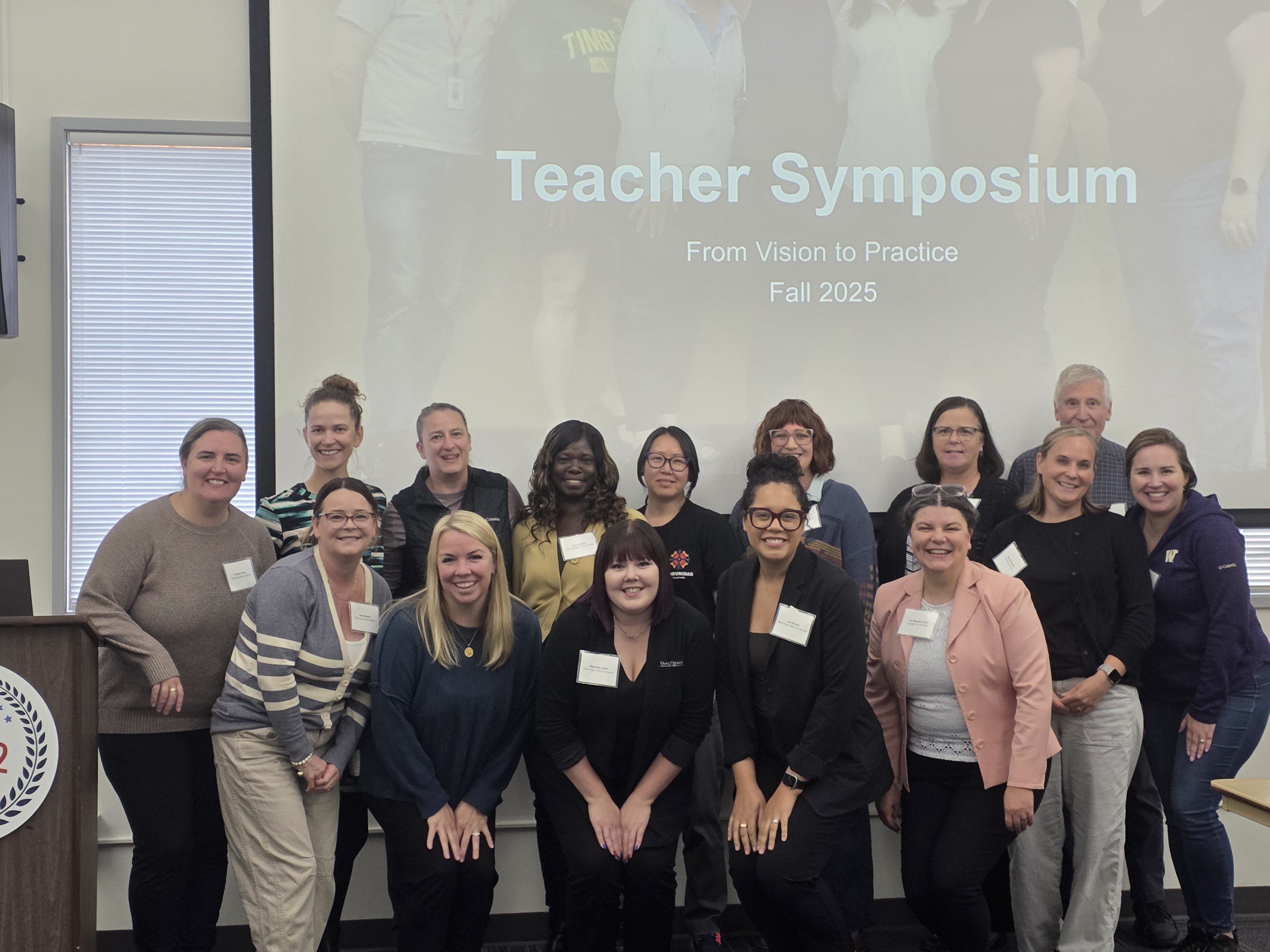Reimagining Healthcare Education
Clark, ESD 112, and industry partners bridge classrooms and careers in healthcare education

ESD 112’s Conference Center in Vancouver hummed with excitement the morning of October 4 as a group of high school educators and healthcare industry professionals came together for “Teacher Symposium: From Vision to Practice.” Coordinated in collaboration between Clark College’s Health Sciences team and ESD 112, the event was the culmination of a year-long initiative that allowed four dual-credit CTE teachers from Vancouver Public Schools to dive into their healthcare curriculum in new and inspiring ways.
Dr. Scot Headley, Dean of Business and Health Sciences, opened the symposium with a warm welcome and a guiding question:
“If resources were unlimited, what might healthcare experiences look like for students?”
That question became the foundation for the project Dr. Headley co-led with Chad Mullens from ESD 112, Lisa Barsotti from Clark’s Allied Health program, and Dr. Maranda Turner from George Fox University. Together, they sought to bridge the gap of healthcare education between K-12 and higher education, giving dual-credit teachers not only the opportunity to dream big, but also the time and support to turn those ideas into tangible classroom projects.
Projects that inspire real-world learning
Over the summer, participating teachers attended a two-day professional learning summit. Immersed in healthcare exploration, the teachers envisioned what ideal learning experiences might look like for their students. They problem-solved challenges students might face, designed work sessions focused on equity and accessibility, and refined individualized projects that they would later present at the symposium.
Colleen Dunegan, Medical Arts Coordinator at Fort Vancouver High School, focused on medical coding. To better understand what her students would experience, she audited Clark’s medical coding class.
Julie Meyers, CTE teacher for the Medical Magnet Program at Fort Vancouver High School, collaborated with colleagues and industry partners to collect classroom resources and hands-on activities.
Brandy Turcotte, Athletic Medicine and Health Dual-Credit teacher, focused on developing curriculum materials that would be accessible to all students.
Natalie Powell, Work-Based Learning Coordinator for Vancouver Public Schools, emphasized increasing student exposure to the healthcare industry, helping students discover what they enjoy doing before committing to a career pathway. Natalie’s research also examined the types of healthcare programs available through Clark, reinforcing how important it is for high school students to understand their postsecondary options early on.
Collaboration and shared purpose
The teachers’ presentations sparked a lively discussion among educators and healthcare partners from PeaceHealth and Vancouver Clinic. Topics ranged from the challenges of isolation within individual school districts to the need for cross-collaboration and resource sharing. Participants also reflected on how broadening awareness of healthcare careers can open new doors for students.
“There are so many pathways in the healthcare field,” said Destiny Barnette, a representative from the Vancouver Clinic. “The problem is the narrow view out there when you’re not in the industry. The more we can help teacher see what’s out there, the easier it is for them to help students narrow down what they want to do, and then how to get there.”
By helping teachers connect directly with college faculty and industry experts, the symposium created a network of professionals united by one goal: preparing students to enter healthcare fields with confidence, clarity, and purpose.
That collaboration is already making an impact. During the symposium, Lisa shared stories of rural high schoolers who completed a two-week healthcare exploration training over the summer—an experience that gave students firsthand exposure to healthcare pathways and demonstrated what strong K-12 and higher education partnerships can accomplish.
Learn more about Health Care Sciences at Clark
Clark College has a long-standing reputation as a premier educator of health care professionals, preparing students for a range of settings including home care, hospitals, medical offices, pharmacies, and dental offices. The Allied Health program inspires the next generation of professionals through hands-on career exploration opportunities in areas such as dental hygiene, emergency medical services, health information management, medical billing and coding, medical assisting, nursing, pharmacy technician, phlebotomy and surgical technology.
Learn more about Clark Health Care & Biosciences.
Photo: Clark College/Malena Goerl
Story by Malena Goerl, Staff Writer, Communications & Marketing
